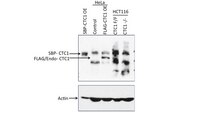MABE1103 Sigma-AldrichAnti-CST complex subunit CTC1 Antibody, clone C482
Anti-CST complex subunit CTC1, clone C482, Cat. No. MABE1103, is a highly specific mouse monoclonal antibody that targets CTC1 and has been tested in and Western Blotting.
More>> Anti-CST complex subunit CTC1, clone C482, Cat. No. MABE1103, is a highly specific mouse monoclonal antibody that targets CTC1 and has been tested in and Western Blotting. Less<<Recommended Products
Overview
| Replacement Information |
|---|
| References |
|---|
| Product Information | |
|---|---|
| Format | Purified |
| Presentation | Purified mouse IgG2b in buffer containing 0.1 M Tris-Glycine (pH 7.4), 150 mM NaCl with 0.05% sodium azide. |
| Quality Level | MQ100 |
| Physicochemical Information |
|---|
| Dimensions |
|---|
| Materials Information |
|---|
| Toxicological Information |
|---|
| Safety Information according to GHS |
|---|
| Safety Information |
|---|
| Storage and Shipping Information | |
|---|---|
| Storage Conditions | Stable for 1 year at 2-8°C from date of receipt. |
| Packaging Information | |
|---|---|
| Material Size | 100 μg |
| Transport Information |
|---|
| Supplemental Information |
|---|
| Specifications |
|---|
| Global Trade Item Number | |
|---|---|
| Catalogue Number | GTIN |
| MABE1103 | 04054839132926 |
Documentation
Anti-CST complex subunit CTC1 Antibody, clone C482 MSDS
| Title |
|---|
Anti-CST complex subunit CTC1 Antibody, clone C482 Certificates of Analysis
| Title | Lot Number |
|---|---|
| Anti-CST complex subunit CTC1, -Q2792891 | Q2792891 |
| Anti-CST complex subunit CTC1, clone C482 - 3393289 | 3393289 |
| Anti-CST complex subunit CTC1, clone C482 - 3989504 | 3989504 |








